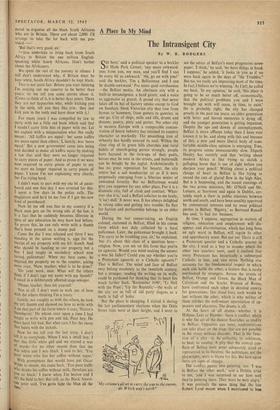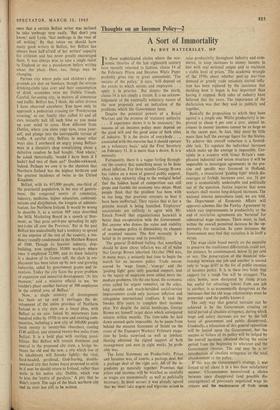A Place In My Mind
The Intransigent City
By W. R. RODGERS
VEE here,' said a political speaker to a heckler at Hyde Park Corner, 'any more awkward- ness from you, my man, and you'll find 1 can be every bit as awkward."Ah, go on with you!' said the heckler, 'I'm a Belfastman and I can be double-awkward.' Pro tank) quid retribuainus —the Belfast motto. An obstinate city with a built-in intransigence, a hard gaiety, and a voice as aggressive as gravel. A proud city that never takes off its hat of factory smoke except to God on Sundays. Stern Victorian city that rose from hymns to hammers, from gutters to gantries, in one go. City of ships, mills and tills, drums and dreams, poetry, piety and porter. No other city in western Europe with a comparable concen- tration of heavy industry has retained its country character so markedly. The smoothing iron of urbanity has hardly 'entered its soul. Within the close ring of its green hills churches and rural habits of church-going persist strongly, people have hayseed in the turn-ups of their pants, horses may be seen in the streets, and buttermilk can be bought by the jugful. Architecturally it has no great reputation for beauty; the city centre has a sad nondescript air as if it were perpetually emerging from a Siberian winter of unwonted ferocity. But no Belfastman would -give you tuppence for any other place. For it is a dramatic city, full of clash and contrast. 'What- ever else it is,' said a Belfast solicitor to me lately, 'it isn't dull.' It never was. It has always delighted in taking sides and getting into trouble. Its flair for faction and partisanship belongs to an older world.
During the last census-taking, an English colonel, stationed in Belfast, filled in his census form which was duly collected by a local policeman. Later, the policeman brought it back. 'I'm sorry to be troubling you, sir,' he explained, 'but it's about this class of a question here— religion. Now, you say on this form that you're an agnostic. Would you mind making the answer a wee bit fuller? Could you say whether you're a Protestant agnostic or a Catholic agnostic?' That is Belfast. The mind and face of Belfast may belong resolutely to the twentieth century, but a stranger, reading the writing on its walls, could be pardoned for thinking that its heart lies much farther back. 'Remember 1690'; `To Hell with the Pope'; 'Up the Republic'—the walls of the city are as full of old party slogans as a moth is full of holes.
But the place is changing. I visited it during the last parliamentary elections when the Divis Street riots were at their height, and I went to 'My column's all set to carry the war to the enemy. sir. Which way's north?'
see the editor of Belfast's most progressive news- paper. 'I think,' he said. 'we have things in hand. I suppose,' he added, 'it looks to you as if we were back again in the days of "the Troubles." But no, we really are improving most of the time. In fact, I believe we're winning.' As I left, he called me back. 'In my opinion,' he said, 'this place is going to be so much better off, economically, that the political problems you and I were brought up with will cease, in time, to exist.' He is probably right; the city has changed greatly in the past ten years; an older generation with bitter and barren memories is dying off, and the younger generation is getting impatient. Despite the ups and downs of unemployment, Belfast is more affluent today than I have ever known it to be, and along with this and because of this, a new and more liberal body of com- fortable middle-class opinion is emerging. True, its progress seems immeasurably slow. Elspeth Huxley has recently said that 'writing about modern Africa is like trying to sketch a galloping horse that is out of sight before you sharpen your pencil.' Writing about a political change of heart in Belfast is like trying to record the rate of glacial flow in the high Alps. But it is happening, and the recent meetings of the two prime ministers, Mr. O'Neill and Mr. Lemass, at Stormont and again in Dublin, cer- tainly mark a thaw in public relations between north and south, and have been sensibly approved by commercial interests and by most political parties in Belfast. 'Bigotry,' as Bertrand Russell has said, 'is bad for business.'
In time, I suppose, segregation in matters of religion, education and employment will dis- appear, and discrimination, which has long been an ugly word in Belfast, will regain its other and approbatory sense. But not yet. There is still a Protestant quarter and a Catholic quarter in the city. I used as a boy to wonder where the other two quarters went, until I realised that every Protestant has historically a submerged Catholic in him, and vice versa. Nothing else accounts for the fundamental respect in which each side holds the other, a feature that is easily overlooked by strangers. Across the streets of Belfast, Orange and Green, the Black Man of Calvinism and the Scarlet Woman of Rome, have confronted each other in devoted enmity for generations; like ritual foes, each would be lost without the other, which is why neither of them relishes the well-meant intervention of ap- peasers and placators. The drama is all.
At the heart of all drama—whether it is CEdipus, Lear or Hamlet—there is conflict, which is why the art 'of the theatre flourishes so readily in Belfast. Opposites can meet, confrontations can take place on the stage that are not possible in the street without disorder. That is the func- tion of a play -to be cathartic, to sublimate, to heal, to resolve. A pity that the central con- flicts of Belfast were never adequately aired or represented in its theatres; the politicians, not the playwrights, were to blame for this. But here again there are signs of change.
The conflict passes into painting, too. 'I was in Belfast the other week,' said a Dublin artist to me, 'and I was surprised to see how well they're painting there. They must be very angry.' It was precisely the same thing that the late Robert Lynd meant when I mentioned to him
once that a certain Belfast writer was inclined to take umbrage very easily. 'But don't you know,' said Lynd, 'that umbrage is the root of all writing.' By that token we should have many good writers in Belfast, but Belfast has always been half-afraid of her writers' capacity for criticism and has never greatly encouraged them. It was always wise to take a single ticket to England or use a pseudonym before writing about the place. Here, too, things may be changing.
Puritan city where pubs and children's play- grounds are shut on Sundays, though the serious drinking-clubs take over and their consumption of drink astonishes even my Dublin friends. Careful, far-seeing city, in matters of commerce and traffic. Belfast has, I think, the safest drivers I have observed anywhere. You have only to approach a pedestrian crossing (or 'Presbyterian crossing,' as our family char called it) and all cars instantly halt till such time as you make up your mind to cross. How different from Dublin, where you close your eyes, cross your- self, and plunge into the unstoppable torrent of traffic. A careful city, Belfast, in many other ways also. I overheard an angry young Belfast- man in a chemist's shop complaining about a defective condom he had bought. 'And where,' he asked rhetorically, 'would / have been if I hadn't had two of them on?' Double-awkward, indeed. Perhaps we owe it to the chemists that Northern Ireland has the highest birthrate and the greatest incidence of twins in the United Kingdom.
Belfast, with its 415,000 people, one-third of the provincial population, is the seat of govern- ment, the congested centre of commerce, industry, medicine, higher education, cortimuni- cations and distlibution, the kingpin of adminis- tration, for Northern Ireland. It would be wrong to describe it, as a certain MP once described the Milk Marketing Board in a speech at Stor- mont, as 'that great oct-d-pus spreading its ugly test-f-cles all over the Province.' But in the past Belfast has undoubtedly had a tendency to sprawl at the expense of the rest of the country, a ten- dency roundly condemned in the Matthew Report of 1960. Though its heaviest industry, ship- building, now employs 10,000 workers where once it employed 22,000, and its linen industry is a shadow of its former self, the slack in em- ployment has been taken up by new and growing industries, aided by government grants and in- centives. Today the city faces the grave problem of expansion and industrial development. 'At this moment,' said a ministry official to me, `we couldn't. place another factory of 300 employees in the central area of Belfast.'
Now, a single ministry of development has been set up and it envisages the de- velopment of the entire province of Northern Ireland as a city state on a lineal plan, with Belfast as an axis, linked by motorways (one hundred miles by 1970) to new and existing com- munities, including a new city of 100,000 people (with twenty to twenty-five churches), costing £140 million, and situated twenty-five miles from Belfast. It is a bold plan with exciting possi- bilities. But Belfast will remain dominant and central to the proposed city state, a bridge be- tween the old and the new, a city which few of its inhabitants will forsake lightly; the vital, hard-headed, go-ahead, God-fearing, double- awkward city that James Joyce proposed to settle in if ever he should return to Ireland, rather than settle in his native city, Dublin, which was to him the 'centre of paralysis.' A pity that he didn't return. The saga of the black northern city and its river has still to be written.



































 Previous page
Previous page